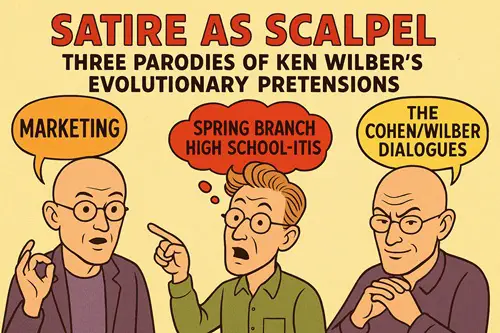|
TRANSLATE THIS ARTICLE
Integral World: Exploring Theories of Everything
An independent forum for a critical discussion of the integral philosophy of Ken Wilber
  Frank Visser, graduated as a psychologist of culture and religion, founded IntegralWorld in 1997. He worked as production manager for various publishing houses and as service manager for various internet companies and lives in Amsterdam. Books: Ken Wilber: Thought as Passion (SUNY, 2003), and The Corona Conspiracy: Combatting Disinformation about the Coronavirus (Kindle, 2020). Frank Visser, graduated as a psychologist of culture and religion, founded IntegralWorld in 1997. He worked as production manager for various publishing houses and as service manager for various internet companies and lives in Amsterdam. Books: Ken Wilber: Thought as Passion (SUNY, 2003), and The Corona Conspiracy: Combatting Disinformation about the Coronavirus (Kindle, 2020).
Check out my other conversations with ChatGPT Satire as ScalpelThree Parodies of Ken Wilber's Evolutionary PretensionsFrank Visser / ChatGPT
 Ken Wilber has long presented himself as the great synthesizer of science, philosophy, and spirituality. His Integral Theory aspires to be nothing less than “the Theory of Everything,” with evolution framed as Spirit's grand staircase. Yet for all its ambition, critics have often charged that Wilber's treatment of evolution is more mystical projection than scientific explanation. Three satirical essays—two by Philip Molina and one by Ray McGuinness—drive this point home with devastating precision. These satires do not engage Wilber through the usual apparatus of academic critique. Instead, they wield parody as a scalpel, exposing through exaggeration and mimicry the hollow core of Wilber's evolutionary claims. Taken together, they represent a kind of underground trilogy of resistance to Integral triumphalism. Molina I: Ken Wilber's Latest AddressPhilip Molina's “Ken Wilber's Latest Address” (2005) takes the form of a mock transcript of a Wilber talk at Integral Institute. What follows is a brilliant lampoon of Wilber's oratorical habits: the endless jargon, the relentless contrasts between 1st and 2nd tier, the run-on sentences, the nasal sniffing and throat-clearing, the relentless self-congratulation (“it's just simply astonishing”). At the heart of the satire is Wilber's relationship to science. Calls for evidence and research are dismissed as outdated, akin to “working with a wooden plow.” What truly matters, the faux Wilber declares, is not evidence but marketing. The climactic punchline—Integral's secret spelled out as “M-A-R-K-E-T-I-N-G”—reduces the whole edifice of Integral Institute to a public-relations scheme. Here, Molina captures in grotesque caricature what critics like Frank Visser have argued in sober prose: that Wilber sidesteps empirical rigor in favor of grandiose proclamation and branding.[1] Molina II: Spring Branch High School-itisIn a companion satire, “Spring Branch High School-itis,” Molina turns to Wilber's youthful intellectual formation. The conceit is simple but lethal: Wilber's grand metaphysical system, which purports to integrate East and West, science and spirit, is nothing more than the high-school syndrome of a precocious but insecure teenager. The parody undercuts Wilber's lofty pretensions by bringing him down to the level of adolescent ambition—forever striving to impress, to one-up, to dazzle with jargon and diagrams. Evolution, in this lampoon, becomes not a scientific problem but a prop in Wilber's eternal quest for validation. McGuinness: The Cohen/Wilber DialoguesRay McGuinness's satire, "The most important conversation of our time!", written as a dialogue between Wilber and Andrew Cohen, amplifies the cultic flavor of Integral rhetoric. Cohen and Wilber egg each other on in an escalating spiral of self-importance, with each proclaiming their spiritual superiority, their unique access to evolutionary truth, and their shared disdain for the merely rational mind. Where Molina mocked Wilber's style and backstory, McGuinness highlights the performative arrogance of Wilber and his inner circle. Evolution is once again the touchstone—presented not as a natural process open to investigation, but as a spiritual destiny that only “we” at the cutting edge can grasp. The satire is especially biting because it exposes the guru-like echo chamber Wilber built around himself, where critique is dismissed as “green” and flattery is the coin of the realm. Common ThreadsThough they differ in tone and technique, Molina's and McGuinness's satires converge on several points of critique: Evolution as Rhetoric, Not ScienceEvolutionary biology is invoked but never engaged. For Wilber, it serves as a backdrop for metaphors of Spirit's unfolding, rather than a field of empirical study. Integral as PerformanceWhether through Wilber's nasal sniffing, his endless jargon, or his cultic dialogues with Cohen, the satires reveal Integral as more stagecraft than scholarship. Marketing Over EvidenceThe repeated conclusion is that Integral thrives not on explanatory power but on promotional skill. It is a brand, not a body of research. Inflated Self-ImageAll three satires ridicule Wilber's conviction that Integral Theory alone sees the whole truth, while critics remain stuck in the “flatland.” The comedy arises from the gulf between the grandeur claimed and the reality displayed. Why Satire WorksAcademic critiques of Wilber—such as those by Visser, Meyerhoff, and others—often founder on Wilber's rhetorical armor. He dismisses them as merely “green” or “flatland,” beneath his integral vision. Satire, by contrast, slips under this armor. By mimicking Wilber's own voice and pushing it to absurdity, Molina and McGuinness create a mirror that Integral enthusiasts cannot so easily deflect. The result is comedy with a sharp edge: we laugh, but uneasily, because the caricatures are so close to the truth. Conclusion: The Emperor's New KosmosWilber's treatment of evolution, framed as Spirit's upward drive, has long drawn skepticism. But while scholarly critique can point out the errors, satire reveals the pretensions. Molina and McGuinness show us Wilber not as philosopher-king of the Integral movement, but as a marketing guru, an insecure teenager, and a guru among gurus, spinning tales of evolution without evidence. In the end, the three satires remind us of the child in the old fairy tale: sometimes the most devastating critique is not delivered in footnotes, but in laughter. NOTES[1] Frank Visser, "Why Ken Wilber is wrong about evolution, And Ignores the Evidence For It", www.integralworld.net
Comment Form is loading comments...
|